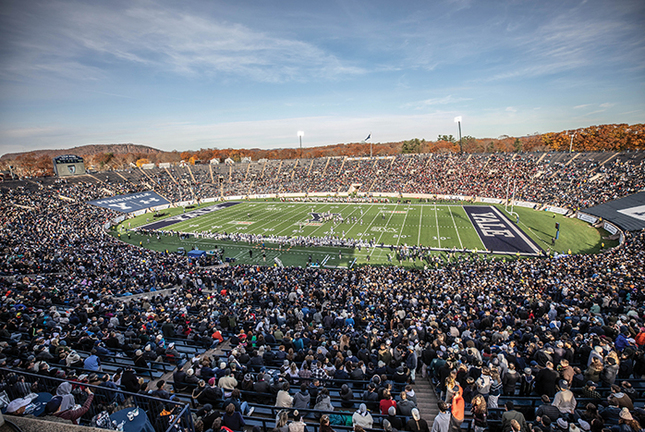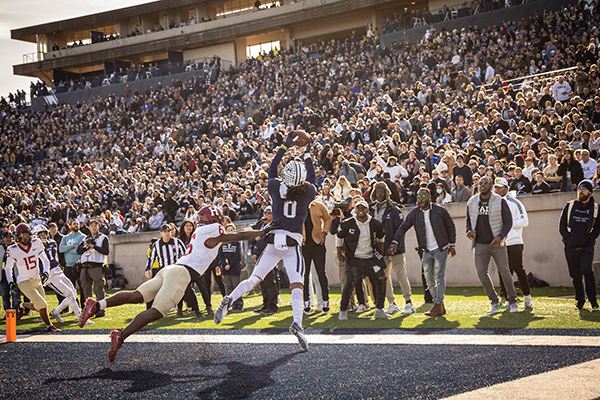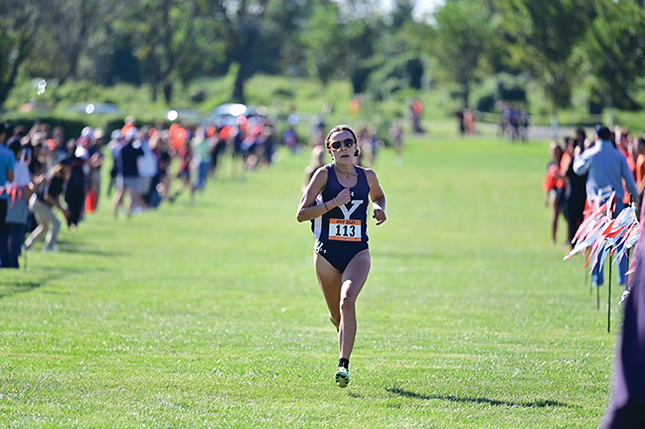
Dan Renzetti
The Yale Bowl was abuzz after a year of silence for the football game with Harvard on November 20.
View full image

Dan Renzetti
The Yale Bowl was abuzz after a year of silence for the football game with Harvard on November 20.
View full image

Dan Renzetti
A touchdown catch by Darrion Carrington ’22 put Yale on the scoreboard in the first quarter.
View full image

Dan Renzetti
A touchdown catch by Darrion Carrington ’22 put Yale on the scoreboard in the first quarter.
View full image

Yale Athletics
All-American cross country runner Kayley Delay ’22 took first place at the Ivy Heptagonals and tenth at the NCAA national championship.
View full image

Yale Athletics
All-American cross country runner Kayley Delay ’22 took first place at the Ivy Heptagonals and tenth at the NCAA national championship.
View full image
After nearly two years, perhaps the clearest sign that Ivy League sports had returned was the sound of nearly 50,000 fans packed into the Yale Bowl for the 137th meeting of Yale and Harvard in football. Though Ivy competition had resumed earlier in the fall, the pageantry of The Game on a beautiful Saturday in November offered both a warm, convivial jolt of tradition and a welcome contrast to the empty stands and lost seasons that came before. The play on the field also rose to the occasion: The Game was a thrilling back-and-forth affair, but one that saw the Bulldogs fall in the final seconds to Harvard, 34–31.
For the defending Ivy League champions, as for all Yale athletic teams, it was an arduous path back to the gridiron after a full season away. Many seniors retained their eligibility to play by not enrolling at Yale for some or all of the last academic year. “Every champion wants to defend their title. Every champion wants to get everyone’s best again. Having 2020 stripped from us felt like a punch in the face, and nobody in our senior class wanted to leave on that note,” said Melvin Rouse II ’22, a leading receiver who was elected by his teammates as this year’s most valuable player. “You either want to defend your title or you want to give it up, but you want to have the opportunity to do it.”
An up-and-down season featured a number of tough losses, including eventual co–Ivy champion Dartmouth and in-state rival UConn, which Yale faced for the first time in 22 years. By the final game of the season, Yale and Harvard had effectively seen their Ivy title hopes dashed. Still, all eyes were on New Haven for a matchup of one of the Football Champion Subdivision’s best defenses versus a young Yale team that had shown flashes of offensive firepower throughout the season.
Quarterback Nolan Grooms ’24, a threat on the ground and in the air, got the Bulldogs on the board early with a nearly perfect 94-yard march down the field on Yale’s opening drive, capped by a 17-yard touchdown throw to Darrion Carrington ’22. But Yale’s early fortune soon faded. Grooms was intercepted on two consecutive pass attempts, and Harvard returned a blocked punt to put the Crimson up 20–10 midway through the second quarter.
What happened next was missed by almost everyone not fortunate enough to be in the Yale Bowl. The Elis shook off their previous missteps and once again methodically drove the ball down to Harvard’s 29-yard line—and then, the broadcast feed disappeared for those watching nationally on ESPNU. While the broadcast cut to commercial, head coach Tony Reno went for it on a gutsy fourth-down play that paid off, as Grooms scrambled and dodged defenders to find JJ Howland ’22 open for a touchdown. That move cut the lead to 20–17 at halftime.
Meanwhile, at-home viewers were left in the dark for more than 30 minutes, an outage that the broadcast team eventually chalked up to “power issues in the area.” When the signal returned, early in the second half, so did the scoring, with Harvard first extending its lead to 10 and then Yale quickly responding with a bruising touchdown run by Spencer Alston ’23. Midway through the fourth quarter, Yale retook the lead, 31–27, on Grooms’s third touchdown pass of the game, this time to freshman David Pantelis ’25.
It was then the defense’s turn to step up in the closing minutes, forcing a punt and then a turnover on downs with just two minutes left, which appeared to put Yale in the driver’s seat. Yet Harvard managed to keep the Bulldogs from what would have been a game-ending first down. The Crimson got the ball back with under a minute left, and it turned out to be more than enough time, as it took just 37 seconds of game clock and three complete passes for Harvard quarterback Luke Emge to notch the game-winning score. “We had an opportunity to put the game away,” said Reno after the loss. “And we didn’t.”
The loss dropped the Bulldogs to a final record of 5–5 on the season and a fourth-place Ivy League finish, marking the end for a highly successful class that had won two Ivy titles. For the seniors, just being able to compete again meant everything. “We would have given anything to play our senior season,” said John Dean ’22, a first-team All-Ivy pick and the team’s captain since 2019. “In terms of sacrifice, I don’t think there’s anything I’d rather be doing right now than being on this team. I would hardly call it a sacrifice.”
In other fall sports, field hockey, men’s soccer, and volleyball all posted winning seasons—for volleyball, the 19th consecutive season above .500. But perhaps the single greatest individual achievement of the season came from Kayley DeLay ’22. DeLay repeated as the individual champion in cross country at the Ivy Heptagonals, finished second at NCAA Regionals, and then capped her season with a remarkable tenth-place showing at the NCAA Championship in Florida. DeLay, who was named an All-American after her final race, earned the best national finish for a Bulldog in over 15 years.
 loading
loading